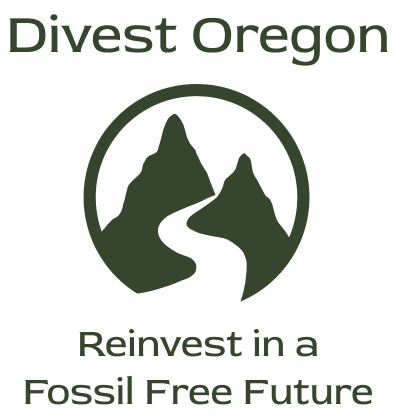What is Divestment?
When you invest your money, you might buy stocks, bonds, or other assets that generate income for you. The Oregon State Treasury invests in the same way.
Most of the funds held by the Treasury are state employee retirement funds (PERS), invested for the long term to be available at the time of an employee’s retirement.
Divestment by the State of Oregon means ending new investment in the fossil fuel industry and phasing out existing fossil fuel investments over time. The money that is currently supporting the fossil fuel industry can be re-invested in a sustainable future for Oregonians.

Why should Oregon Divest?
The funds of PERS and the Oregon Treasury are at risk. Those funds should be put into climate-safe investments that increase our resiliency as a people and as a state.
It has been clear for years that institutions need to protect the returns of their pensions by divesting from fossil fuels. In the past decade, the data has been growing, and retirement funds have received a return on their fossil fuel investments that is below the market. With the 2022 war in Ukraine, the fossil fuel industry market has been more volatile than usual, but that doesn't change the big picture: the fossil fuel industry is a dying industry and investments in that sector will be evermore difficult to sell.
The urgency of the climate crisis demands that we act now. Only rapid and drastic reductions in greenhouse gases can prevent widespread devastation and extreme weather, and time is running out. A 2021 report from the International Energy Agency (IEA) issues a rock-solid conclusion: There can be no new fossil fuels in a net-zero by 2050 pathway (BankTrack 5/18/21), confirmed by the Intergovernmental Panel on Climate Change (IPCC)
April 2022 report.
Simply stated, financial institutions must immediately halt all financing of fossil fuel expansion and phase out all fossil fuel holdings.

